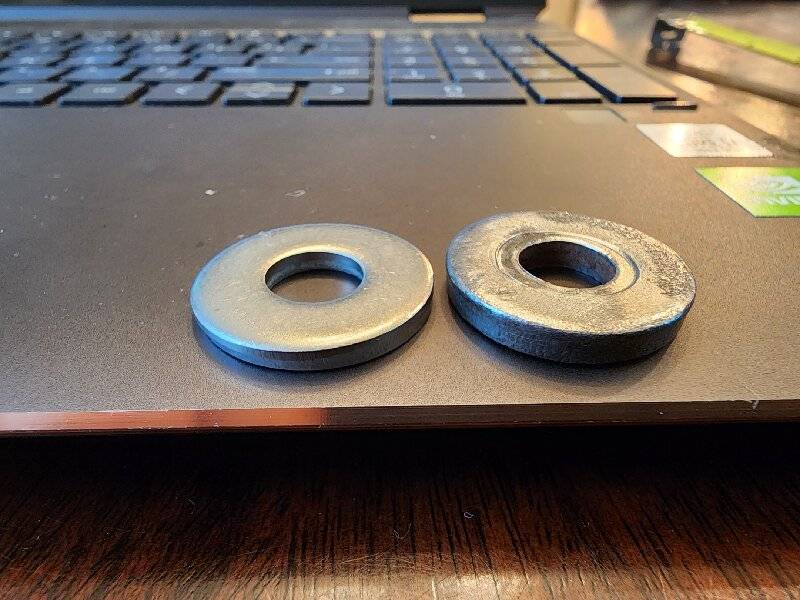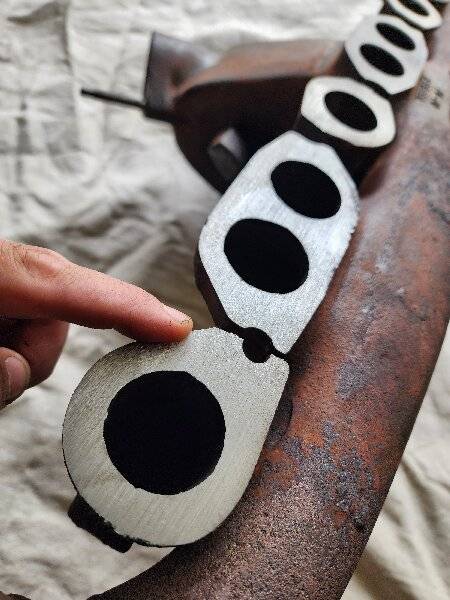|
Re: Manifold Washers
|
||||
|---|---|---|---|---|
|
Home away from home
|
Lord I would sure hope that stainless washers wouldn't deform in 200 degree heat. The heat expansion coefficient is slightly different, but I doubt it would have any effect in practice... the washer will try to get 30 microinches thicker than the steel assembly it is in, between a cold and hot engine.
As for strength, I don't recall the original washers being stainless; if that's correct, the new washers will no doubt be stronger than the old. Why not just stack 2 washers?
Posted on: 2023/6/23 15:39
|
|||
|
1955 400 | Registry | Project Blog
1955 Clipper Deluxe | Registry | Project Blog 1955 Clipper Super Panama | Registry Email (Parts/service inquiries only, please. Post all questions on the forum.) service@ultramatic.info |
||||
|
||||
|
Re: Manifold Washers
|
||||
|---|---|---|---|---|
|
Forum Ambassador
|
As I recall Cli55er was able to find or have the extra thick washers made at a place that sold stainless steel bolts. If you have concerns about the McMaster items perhaps you could send him a PM or else if you have a lot of time, I think he may have given the name of the company in his 55 Clipper project blog.
Posted on: 2023/6/23 16:51
|
|||
|
Howard
|
||||
|
||||
|
Re: Manifold Washers
|
||||
|---|---|---|---|---|
|
Home away from home
|
I think I'm overthinking this one. I don't have any sort of an engineering background, so I always try to stick to whatever came on the car if possible, and when I find myself deviating from what was originally on the car, I get concerned.
The issue I keep thinking of (that may not be an issue at all) is that the original washers, thick as they are, aren't just doing the work a washer does, but also adding rigidity to the mount. I didn't stack washers because I honestly didn't know if that sort of setup would indeed mimic the rigidity of the solid washer, or if the stacked washers would still be able to slide or bend. The unknown and question for me is although the modern washer is physically thinner and lighter, is the material out of which it's made stronger than the original, and is it adequate to both distribute the load of the nut and ensure the mount is wholly rigid? The main thing for me is that this is the second time I'm doing this particular project since doing it about eight months ago. I've learned a lot in that time and found most of the "prep work" I had done, and the "process" I "followed" was simply inadequate, and I had both vacuum and exhaust leaks. Take away - I just don't want to do this project again until the engine is getting a full makeover, and I'm being overly cautious and doing my best to hit it fully informed/prepared. Fast forward to this time around... tracked down the correct hanger for the exhaust pipe so that stops swinging and pulling the flange apart, better prepared surface on the block, had the exhaust/intake surfaces milled together to account for warping/pitting, better plan for approaching the fastening of the manifold (inside studs to out), and so on. I just don't want my gaskets to fail because I didn't use the right washers...
Posted on: 2023/6/23 22:09
|
|||
|
Joe B.
Greenville, NC 1950 Super Deluxe Eight Touring Sedan, Model 2302-5 327 w/ Ultramatic, 6v+ |
||||
|
||||
|
Re: Manifold Washers
|
||||
|---|---|---|---|---|
|
Home away from home
|
When you get the washer issue sorted out, I suggest that you carefully torque the nuts or bolt much the way you would do head bolts/nuts. Tighten them in 3 stages, then run the engine for a few minutes, shut it off, and recheck them all.
After that, I'd drive it normally for 15-20 miles, then shut it down and let it cool, then recheck again for even tightness. Excessive tightening can break a fastener or crack one or both manifolds. Of course, they have to be tight enough. Use factory torque specs, if available. I'd use a torque wrench regardless. Be sure all threads are in good condition and clean. I'd put a little oil or Neverseize on them. Most inline engines I've come across have the thick washers or washer plates on the manifold assembly mounting, and the manifold flanges do not fit tightly around the studs or bolts that hold them to the block or head. There are challenges with mounting these assemblies due to the extreme temperaturers the exhaust manifold reaches, while at the same time the intake manifold is both hot and cold under many operating conditions. Some stretch and slip is designed into the fasteners and gasketing to allow for unequal expansion. I'd want to follow the manufacturer's recommended procedures as closely as possible.
Posted on: 2023/6/23 22:30
|
|||
|
||||
|
Re: Manifold Washers
|
||||
|---|---|---|---|---|
|
Home away from home
|
The flatness of the washers is not critical so no worries there. It’s not tight on the stud so will align itself and put equal pressure on both sides of the opening.
Posted on: 2023/6/24 1:51
|
|||
|
All generalities are false.
Once I thought I was wrong but I was mistaken. Don Pierson Packard / IMPERIAL page CA DMV Licensed Vehicle VIN Verification 1951 Henney-Packard 3-Door Long Wheelbase Air Force Ambulance The 1951 Henney-Packard is For Sale! 1954 Packard Patrician 1954 Packard Patrician Parts Car 1956 Clipper Custom Sedan |
||||
|
||||
|
Re: Manifold Washers
|
||||
|---|---|---|---|---|
|
Home away from home
|
A common issue. They did cast connections differently back then. Cast iron recipe/tech changes over time. Stainless may discolor with temperature cycling.
Those thick manifold washers are either heavy duty or extra heavy duty and are still available, but you have to search for them. Won't find at the local hardware/bigbox/maintenance supply. Specialty fastener places only. Here's an example. mutualscrew.com/department/extra-heavy-flat-washers-20073.cfm I had a washer chart but can't seem to locate now. My computer storage is way fragmented after years of use. There's too many stds used and they change over time, or not followed, and you have to find the right one when dealing with period fasteners. Even USS vs SAE are not the same. Off shoring and mergers really messed fasteners up too. A lot of people try to reuse them when they can't find and that's not good for some things either. Most of the hardware stuff is junk and not SAE grade, so don't go there. It'll drive one nuts, which explains a lot about me... You should be glad you don't have to do British std. when you're fettling with your spanner under you're bonnet... Some of the classic "union jack" cars use them. Same applies to bolts, and there's different grades beyond what most are used to/heard of. Most people haven't done industrial so this is unexplored territory. Some places may have stuff, but not all on their online stores. Fastenal is like that. Now we're being hit with post covid "partus obsoletus" too.
Posted on: 2023/6/24 8:52
|
|||
|
||||
|
Re: Manifold Washers
|
||||
|---|---|---|---|---|
|
Webmaster
|
I belive Hank got his washers from TotallyStainless.com
Posted on: 2023/6/24 16:17
|
|||
|
-BigKev
1954 Packard Clipper Deluxe Touring Sedan -> Registry | Project Blog 1937 Packard 115-C Convertible Coupe -> Registry | Project Blog |
||||
|
||||
|
Re: Manifold Washers
|
||||
|---|---|---|---|---|
|
Home away from home
|
If you have had the manifolds planed then you already addressed the major issue. Be sure to take file and break all the sharp edges on the manifold runners so they do not dig into the gaskets but rather skate over them as the manifolds expand and contract.
Unless the washers are horribly bent their condition is trivial. Smack 'em flat with a hammer.
Posted on: 2023/6/24 18:52
|
|||
|
||||
|
Re: Manifold Washers
|
||||
|---|---|---|---|---|
|
Home away from home
|
Thank you so much, everyone. Seems like I'm making a mountain out of a molehill.
Ross - just make sure I understand. When you say "manifold runners," you're talking about these edges in the picture, correct? Thanks again!
Posted on: 2023/6/26 11:07
|
|||
|
Joe B.
Greenville, NC 1950 Super Deluxe Eight Touring Sedan, Model 2302-5 327 w/ Ultramatic, 6v+ |
||||
|
||||

 Washers.jpg (226.28 KB)
Washers.jpg (226.28 KB)








